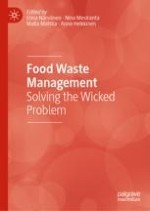2020 | OriginalPaper | Buchkapitel
8. Creating Resilient Interventions to Food Waste: Aligning and Leveraging Systems and Design Thinking
verfasst von : Danielle Lake, Amy McFarland, Jody Vogelzang
Erschienen in: Food Waste Management
Aktivieren Sie unsere intelligente Suche, um passende Fachinhalte oder Patente zu finden.
Wählen Sie Textabschnitte aus um mit Künstlicher Intelligenz passenden Patente zu finden. powered by
Markieren Sie Textabschnitte, um KI-gestützt weitere passende Inhalte zu finden. powered by
